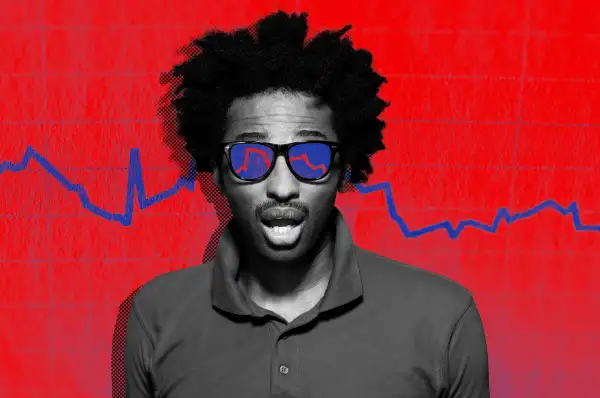The Economy Is Shrinking. Are We Officially in a Recession?

Americans have gotten used to grim economic news lately. The inflation rate is soaring, the Fed is hiking interest rates at a rapid pace to prevent prices from rising further, and the bear market persists. Is a recession next?
Gross domestic product — a statistic that experts use to measure the country’s economic output — shrank at a rate of 0.9% in the second quarter of 2022, according to data released Thursday by the Bureau of Economic Analysis. That follows a contraction of 1.6% in the first fiscal quarter.
While two consecutive quarters of negative growth are often considered to be a sign of a recession, that trend alone isn’t enough for the U.S. government to officially declare we’re in a recession (more on that later). But that hasn’t stopped politicians and economists from arguing about what the new data means — and whether it’s being properly characterized.
“Be honest. It’s a recession,” the Republican House Judiciary Committee tweeted Thursday, while lawmakers like Sens. Marco Rubio, R-Fla., and Josh Hawley, R-Mo., railed against what they’re calling the “Biden recession.”
Are we in a recession?
Formally, no. A committee at the National Bureau of Economic Research (NBER) that focuses on business cycles makes the official determination about whether we’re in a recession or not. The committee, which includes eight economists, has not taken that step. That said, the group generally makes the formal determination about a recession retroactively, so it’s possible that a 2022 recession has already started.
On its website, the NBER defines a recession as a “significant decline in economic activity that is spread across the economy and lasts more than a few months." Moody’s Analytics, an economic research firm, predicts that the latest GDP dip isn’t severe enough to warrant the label.
“Though many call two consecutive declines a recession,” Moody’s senior director Scott Hoyt wrote Thursday, “Moody’s Analytics does not believe current conditions will meet the National Bureau of Economic Research’s criteria for depth, diffusion and duration to be officially called a recession.”
Are we headed for a recession?
It depends who you ask.
Federal Reserve Chair Jerome Powell said in a Wednesday news conference that he does not believe the U.S. is currently in a recession, though he advised taking Thursday’s data with a “grain of salt” because the numbers are usually revised after they are released.
For its part, the White House is emphasizing the strength of the economy, noting that interest rate hikes by the Federal Reserve meant that some slowing growth was inevitable.
“Our job market remains historically strong,” President Joe Biden said in a statement Thursday, “with unemployment at 3.6% and more than 1 million jobs created in the second quarter alone. Consumer spending is continuing to grow.”
What is a recession?
A recession happens when the economy slows down for a period of time, usually after a period of growth. Economists consider a wide range of factors in making their determinations about a recession, including the labor market, industrial production, consumer spending and saving, and more.
What causes a recession?
A number of economic factors can contribute to a recession. An analysis from the Congressional Research Service named an overheated economy (high inflation and uncharacteristically low unemployment), asset bubbles (like the dot-com bubble of the early 2000s and the housing bubble that preceded the 2008 recession), and unexpected economic shocks (like the oil shock of the 1970s) as some of the major precipitating factors that lead to recessions.
How long do recessions last?
Recessions can last anywhere from a few months to a few years. The last recession, spurred by the pandemic, officially started in February 2020 and lasted just two months. The recession that began in December 2007 and ended in June 2009 was the longest since the Great Depression.
(FYI: There's a difference between a recession and a depression. Depressions tend to be much more severe and much less frequent than recessions. They're generally characterized by prolonged periods of high unemployment and bigger slowdowns in economic activity.)
What does a recession mean for you?
While recessions are regular occurrences in the cycles of the economy, they may mean some changes in your daily life. When people start to worry about a slowdown, they spend less. High inflation compounds that problem, because everyday essentials like gas and groceries are eating up a larger portion of consumer budgets.
Less consumer spending means that businesses might scale back to cut costs. Oftentimes, those cutbacks include eliminating jobs or restricting raises. You might notice prices in the supermarket start to fall.
If you're looking to prepare for a recession, you may want to ready yourself to see your stock portfolio decline — but remember that making big changes to your investment plan during market downturns is never a good strategy. This is also a great time to check in on your emergency fund, which should be stored in cash and include three to six months of essential expenses.
More from Money:
What Is a Recession, and Are We in One? Money Asked 3 Economists to Weigh in
Have Stocks Hit Bottom? Here's What Experts Say
Is a Recession Coming Soon? This Bond Market Indicator Is Flashing Red

